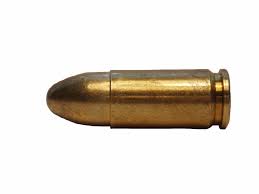bullet
英 [ˈbʊl.ɪt]
美 [ˈbʊl.ɪt]
- n. 子弹;只选某党全部候选人的投票;豆子
- vi. 射出;迅速行进
- n. (Bullet)人名;(法)比莱
使用频率:

记忆方法
记忆“bullet”这个单词,可以将其与“ball”进行联想,因为两者都含有“球状”的概念,但“bullet”是一个“子弹”,通常想象成较小的球形,具有力量和速度。通过将“ball”的小型化并赋予其“枪械中飞行的”特点,可以帮助记忆“bullet”这个词。
以上内容由AI生成, 仅供参考和借鉴
中文词源
bullet 子弹
bull, 词源同ball. -et, 小词后缀。
英语词源
- bullet
-
bullet: [16] Etymologically, a bullet is a ‘little ball’. It comes from French boulette, a diminutive form of boule ‘ball’, from which English also gets bowl, as in the game of bowls. It originally meant ‘cannon-ball’ as well as ‘rifle or pistol projectile’, but this sense had effectively died out by the mid-18th century.
=> bowl - bullet (n.)
- 1550s, from Middle French boulette "cannonball, small ball," diminutive of boule "a ball" (13c.), from Latin bulla "round thing, knob" (see bull (n.2)). Earliest version of bite the bullet recorded 1891, probably with a sense of giving someone a soft lead bullet to clench in the teeth during a painful operation.
权威例句
- 1. Everywhere building facades are pitted with shell and bullet holes.
- 任一处的建筑物正面都布满了弹洞。
- 2. An 8-year-old boy was killed by a stray bullet.
- 一名8岁男孩儿被流弹打死。
- 3. The bullet slammed into the ceiling, spraying them with bits of plaster.
- 子弹砰地射进了天花板,掉落的石膏碎片落了他们一身。
- 4. His life was saved by a quarter-inch-thick bullet-proof steel screen.
- 多亏一块1/4英寸厚的防弹钢板,他才捡了条命。
- 5. The bullet lodged in the sergeant's leg, shattering his thigh bone.
- 子弹嵌进了中士的腿里,使其股骨碎裂。
